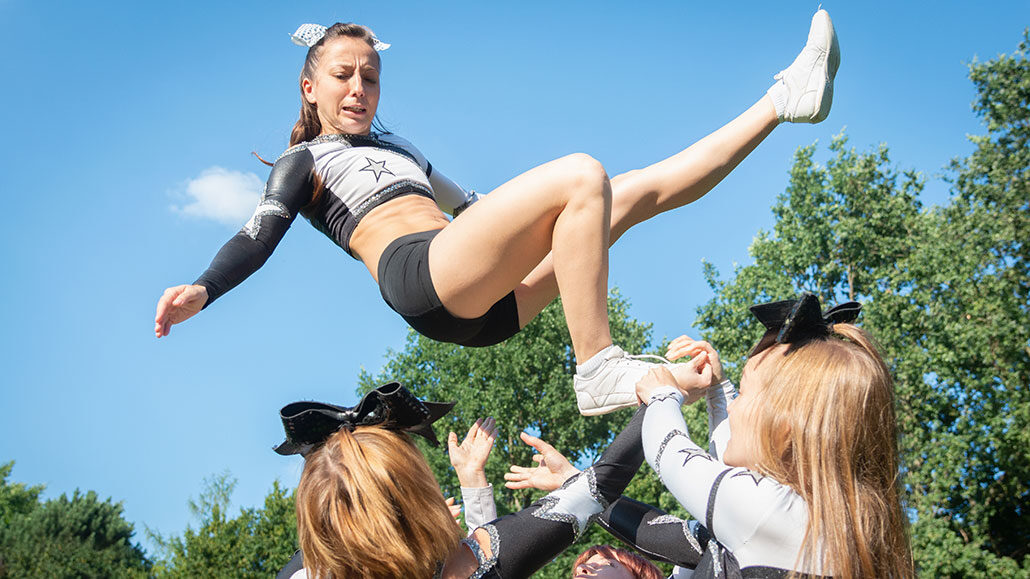Many student athletes face risk of concussions that heal slowly
Recovery appears longer for girls and any high school athlete with a previous concussion

For reasons that are not yet entirely clear, recovery from concussions appears to take longer in girls than boys.
Mlenny/E+/Getty Images
A blow to your head from a fall or collision with a sports teammate can really jolt your brain. This can cause a type of injury known as a concussion. A wide range of high school athletes may be at risk for this. And following such an injury, those athletes may need a month or more to recover, a new study finds.
Scientists and doctors had once thought kids recovered faster from concussions than do adults. Indeed, young athletes with concussions often returned to sports right away, sometimes on the same day.
But new studies are showing that kids do not heal quickly. The latest study looked at just how long that recovery can take.
Toufic Jildeh led the research. An orthopedic surgeon, he works at the Henry Ford Health System in Detroit, Mich. “On average, high-school athletes with concussion take about one month to return to play,” his team found. “And additional rest is needed after additional concussions.”
What’s more, girls seem to face a special risk. Their recoveries take longer.
Jildeh and his team reported their findings July 1 in Orthopedics.
The most common sport responsible for concussions was football. Next in line were hockey, soccer, basketball and cheerleading. In fact, the study found, nearly any sport can put an athlete at risk of a concussion.
Repeated blows to the head
Jildeh’s team reviewed medical records for 357 high-school athletes between the ages of 14 and 18. All had been treated for a concussion. And about one in every three of them had been concussed before.
Each student went through a battery of medical tests. These evaluated memory, motor speed and reaction time. Such tests had help doctors assess whether someone is ready to play again.
The really concerning finding, Jildeh says, was that athletes with a previous head injury take longer to recover. To him, this “suggests that prior concussions may have lingering effects.”
That finding is striking, says Kathryn Manning. She is a brain-imaging expert at the University of Calgary in Alberta, Canada and wasn’t involved in the study. More long-term research is needed to understand the harm of single and multiple concussions, she says. “What we don’t know,” she explains, “is 20 years down the road, after these athletes have retired from their sport, are they completely normal? Or are there long-term effects?”
Among study participants, 38 percent were girls. And they reported taking longer to recover, the study found. Those results are in line with previous studies showing that men and women respond differently to these head injuries.
Elizabeth Teel is an exercise scientist at McGill University in Montreal, Canada. Researchers don’t know why girls and women appear to take longer to heal, she says. “There’s not a firm answer,” she points out. Indeed, caution the researchers, it’s possible that both sexes take equally long to heal, but that boys simply may stop reporting symptoms earlier in their recovery.
Still, a few studies have found that the brains of male and female athletes can differ in their response to injury. For example, female athletes show more widespread brain damage after concussions than do male athletes. That, too, might explain why girls need more time to recover.
Are teens different?
The new study’s focus on high-school athletes was unusual, both Manning and Teel say. A lot of concussion research looks only at adults. But the older brain may react to head injuries differently than do the brains of children. “Even at the high-school age, children are not small adults,” Teel notes. “We need more tools to help diagnose kids with concussion and also to help return them to play.”
So, what’s the take-home message if you play sports?
First, know the symptoms of a concussion. This injury can cause you to black out or feel confused. You might develop a headache, dizziness, nausea or vomiting. If you experience any of these symptoms, report them to your coach, athletic trainer or parents. And do it right away.
Then listen to your doctors. They will carefully assess when you can safely return to sports. Don’t go back until you’ve gotten their okay. Your brain will heal in its own time. So don’t rush it. Your brain will thank you.







